Published Jun 19, 2022
Benjamin Sisko is One of The Greatest Fathers in TV History
"Sisko’s warm, present parenthood remains one of the healthiest, most aspirational father-son relationships in all of science fiction."
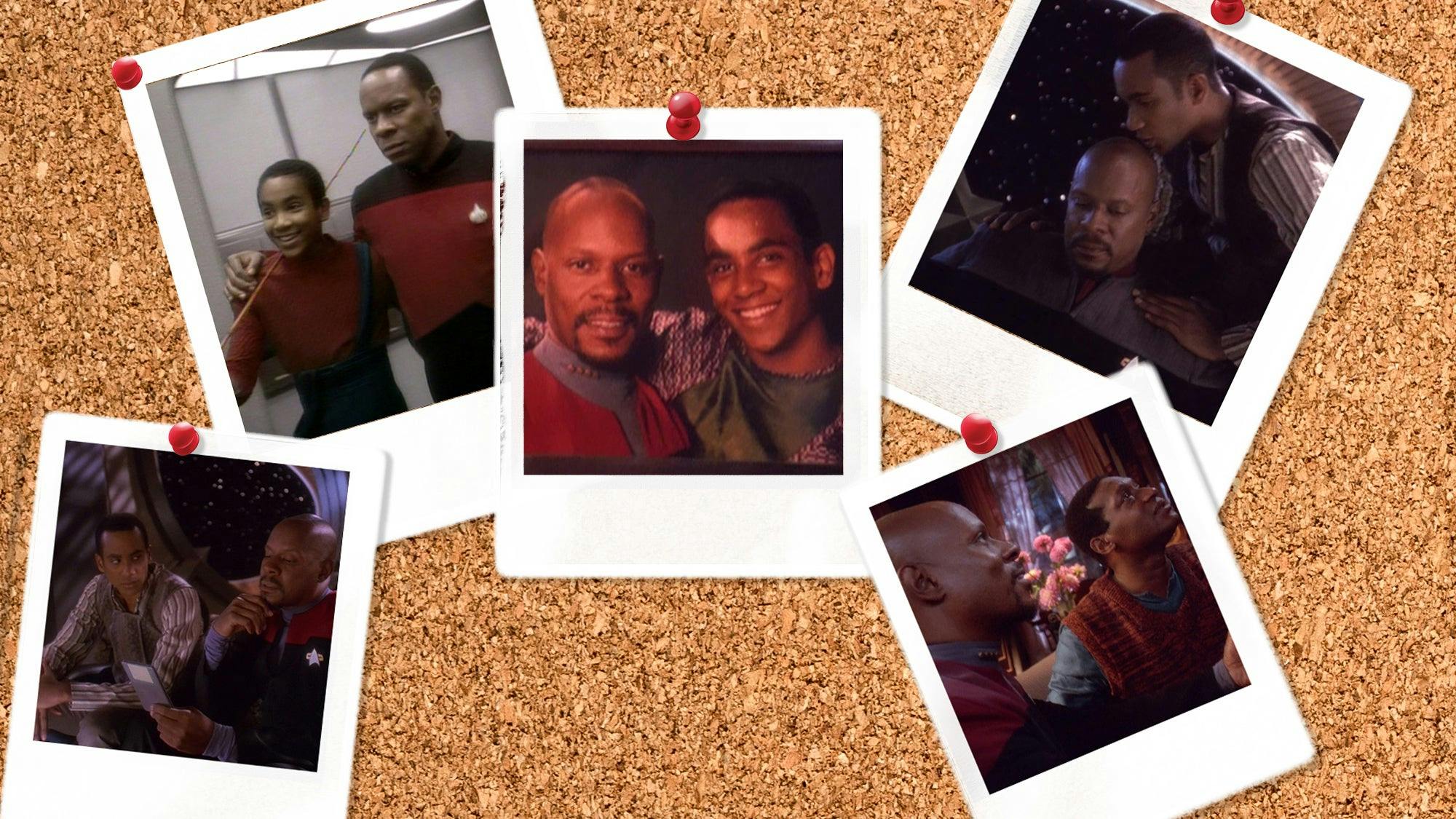
StarTrek.com
This article was originally published on June 14, 2019.
I love my father more than anything in the world, even if we don’t have all that much in common. He’s an easygoing, principled farmer from downstate Illinois who loves hunting as much as he does his two now-giant labradors; I’m a neurotic, nerdy city kid who fled my rural hometown as quickly as possible for the big city of Chicago, making my living opining on pop culture for the Internet. Despite those differences, there was always one interest we unabashedly shared: Star Trek.
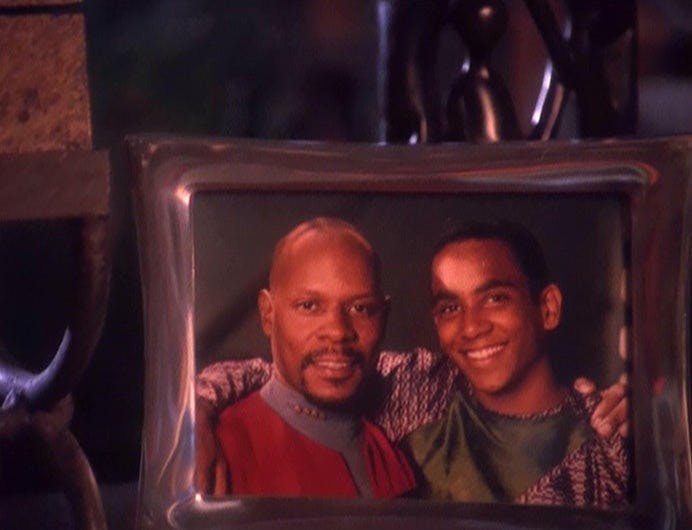
StarTrek.com
Growing up, my father would take me to every theatrically-released Trek film (our first was The Voyage Home; I wasn’t even one year old yet) and we’d watch The Next Generation and Deep Space Nine on a regular basis. He’d buy me Trek books and toys — one time, he and my uncle even got me a hanging Enterprise-A theater display which I’d occasionally hang haphazardly in my room. Our interests couldn’t be more different apart from that, but I’ll always feel connected to him in large part through Trek.
With Father’s Day on the horizon, I feel summarily compelled to look at fatherhood through the prism of Trek itself. Like a lot of primetime dramas, the franchise has no shortage of dysfunctional dads — take William Riker’s distant dad Kyle in TNG, for instance, or James T. Kirk’s fractious relationship with estranged son David Marcus in The Wrath of Khan. But the most idealistic, utopian version of fatherhood Trek ever committed to screen ironically came from the grittiest take on Roddenberry’s future to date: Captain Benjamin Sisko in Star Trek: Deep Space Nine.
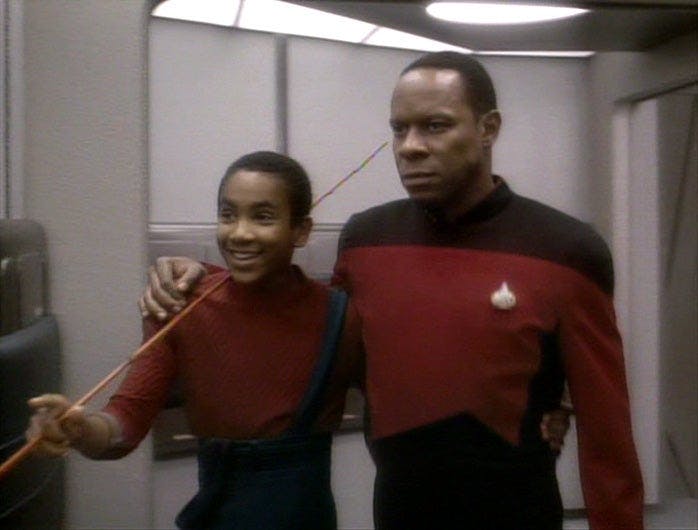
StarTrek.com
Played with alternating imperiousness and warmth by the incomparable Avery Brooks, Sisko had a greater burden to bear than either of Trek’s prior series leads. In the pilot, “Emissary,” he’s a man haunted by the death of his wife Jennifer at the Battle of Wolf 359, someone disillusioned by his role in Starfleet and dreading the prospect of raising his teenage son Jake in a ramshackle space station, formerly occupied by the Cardassians. Over the course of the series, however, he learns to process his grief, slowly but surely turning Terok Nor into not just a vital Federation outpost, but a warm home for himself and his son.
Watching Ben and Jake’s relationship over the long seven years of DS9’s run, it was impossible not to see parallels between my own dynamic with my father. In the first few seasons, both Siskos are adjusting to life on this strange new station — Ben struggles to parent a grieving child whose choice in friends (Nog) and hobbies (loitering on the Promenade) he hardly approves of, while Jake is just trying to find his new normal in such a dangerous place.
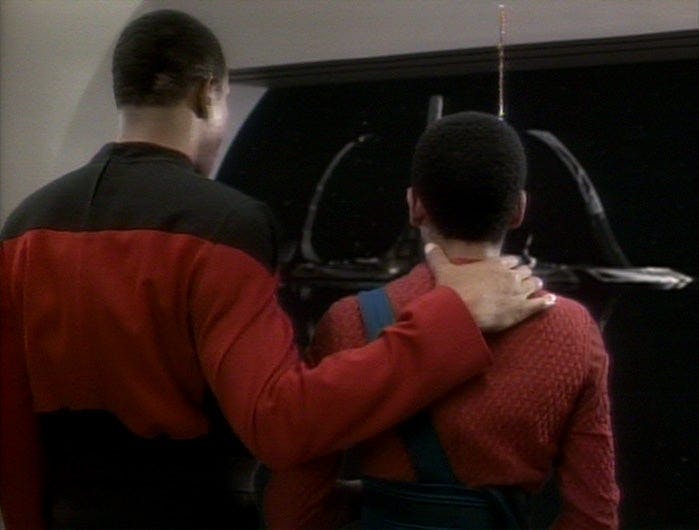
StarTrek.com
No matter their issues, though, Ben consistently makes himself emotionally available to counsel Jake through his struggles, and the two draw unexpected strength from each other. Their relationship is consistently based on a core of mutual respect, trust, and emotional intelligence; Ben leans on his son as much as his son leans on him, with the two growing and changing together in ways not often shown on television. Brooks frequently played Sisko with a booming theatricality, but it’s in these intimate moments that we got to see the man behind the captain’s chair.
As Jake came into his own as a man, the writers of Deep Space Nine largely elided the impulse to turn him into a bratty, rebellious teen by allowing him and his father to grow apart from each other while maintaining the respect we’d seen demonstrated since their opening lines together, fishing on the holodeck. In “Explorers,” the two bond over the building and testing of an old Bajoran solar sailer, which also gives them the opportunity to talk about Jake’s budding writing career. Jake’s eventual decision not to follow in his father’s Starfleet footsteps, and Ben’s gradual acceptance of that, always reminds me of my own father’s realization that I wouldn’t be taking over the family farm. To realize your son has a different destiny than the one you set out for him, and to respect him for that, evinces a strength one hopes all fathers can demonstrate.
But it’s impossible to talk about the depths of the Siskos’ love for each without re-watching the Hugo-award-winning, season-four episode “The Visitor,” which sees Jake dedicating his entire life to rescuing his father from a temporal anomaly that zaps him back to our reality once every few years. The episode takes place from Jake’s perspective, but imagine what it must have been like for Ben — seeing your son’s life flash before your eyes while you stay eternally young, a violation of the natural relationship between a parent and child, only to see him spend his life clinging onto you instead of living his own life. “It's life, Jake!” he pleads with his now-elderly son. “You can miss it if you don't open your eyes."
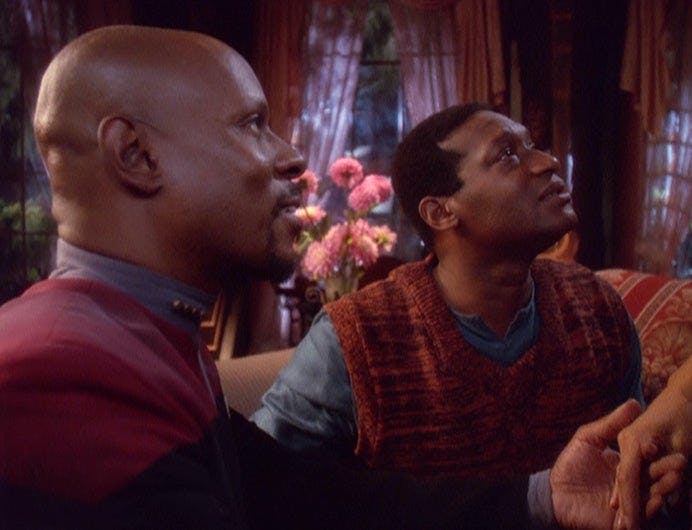
StarTrek.com
It’s also impossible to talk about Sisko and Jake’s relationship without touching on their Blackness, which itself served as vital representation for Black fatherhood on television. Within DS9’s contemporaries (and even today, to some extent), Black fathers were condemned as strict, patriarchal, frequently absent in their children's lives, an extension of racist myths of “the missing black father.” Critics of color are more qualified to speak with greater alacrity to that experience (Vulture’s Angelica Jade Bastién among them), but it’s hard to deny the importance Sisko’s warm, loving, present parenting style carried to young Black and brown men and women, even today.
Ostensibly, the Federation exists in a post-racial universe, but Sisko’s visibility — not just as a good Black father, but one of the few science-fiction shows with a Black lead — was incredibly important. Sisko proudly celebrates his New Orleans heritage, including Jake and his staff in regular home-cooked meals from scratch (no replicators), which he learned from his own father’s Creole recipes. In “Badda-Bing Badda-Bang,” Sisko reminds Kasidy, Jake and the audience that, in the real-life era Vic Fontaine’s holosuite simulated, people of color were far from welcome; to pretend otherwise is erasure. As a father and a man, Sisko didn’t just have to provide a good example for Jake: he had to carry the burden of their people’s history, even in a future that claims to have left it behind.
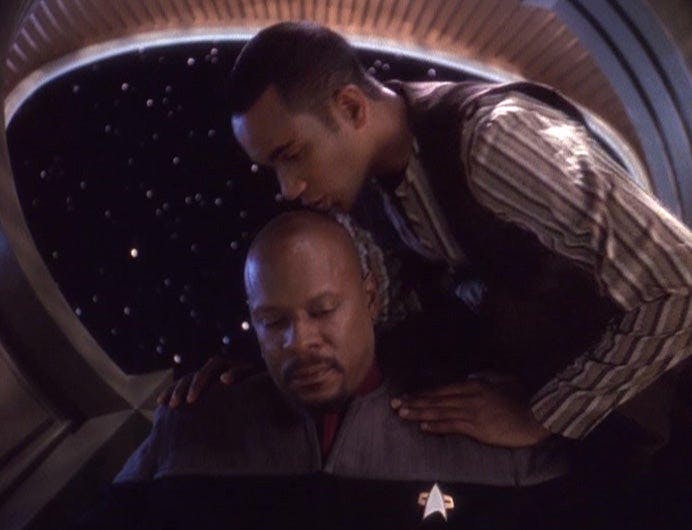
StarTrek.com
Of Sisko’s role as a parent in the show, Brooks said in an interview, “It’s something that we have to see more often, the relationship of a brown man and his son. Because historically, that’s not how it began in this country for brown families who didn’t have the freedom of their own will and volition, let alone the ability to hold their families together.” This carries through in his handling of the character in the series’ ending; he urged the writers to reword the ending of the series, in which Sisko leaves the station to join the Prophets, to avoid the perception that he was yet another Black father abandoning his children.
Speaking broadly, however, Sisko’s warm, present parenthood remains one of the healthiest, most aspirational father-son relationships in all of science fiction. Endlessly present and unafraid of vulnerability, he’s the ideal of the type of supportive presence that any son or daughter would be lucky to have in their lives.
My relationship with my father wasn’t nearly as tight-knit as the Siskos’. But he taught me so many other great lessons — the importance of hard work, of living up to your promises, of cultivating positive relationships with others. We may have never played baseball together in the holosuite, but we’ll always be able to bond over Star Trek. If and when I ever become a father, I’ll have two great dads as a template: my own and Benjamin Sisko.
Clint Worthington is a Senior Writer for Consequence of Sound and editor-in-chief of The Spool, and you can find him on Twitter at @clintworthing. He lives in Chicago with his wife and cat.

